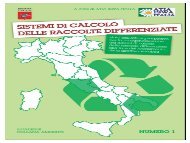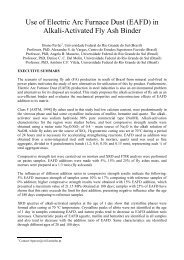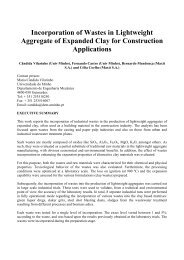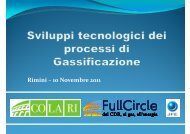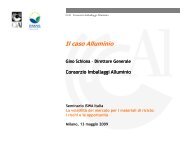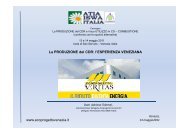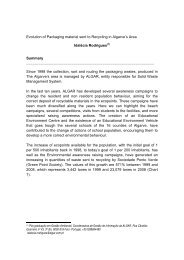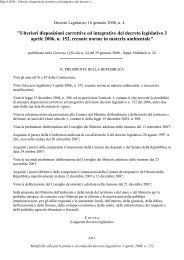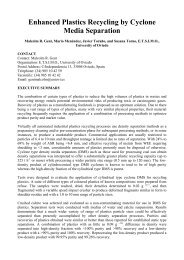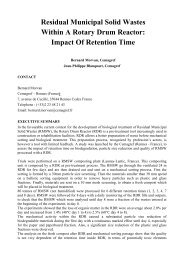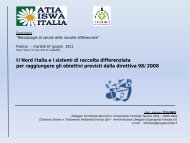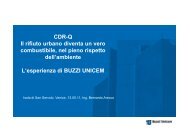waste management and the mediterranean ... - ATIA-ISWA Italia
waste management and the mediterranean ... - ATIA-ISWA Italia
waste management and the mediterranean ... - ATIA-ISWA Italia
- No tags were found...
You also want an ePaper? Increase the reach of your titles
YUMPU automatically turns print PDFs into web optimized ePapers that Google loves.
Antonis Mavropoulos, CEO EPEM SA, <strong>ISWA</strong> STC Chair,amavrop@epem.grWASTE MANAGEMENT AND THEMEDITERRANEAN ECOSYSTEM
To be discussed• Global trends for <strong>waste</strong> <strong>management</strong>• Mediterranean ecosystems <strong>and</strong> societies• The need for a Mediterranean Cooperation regarding WasteManagement
Global trends for <strong>waste</strong> <strong>management</strong>• Increasing quantities of <strong>waste</strong>• Composition will keep changing – new products new<strong>waste</strong>• Current systems in place are not capable to control <strong>the</strong><strong>waste</strong> volumes coming• Infrastructure is required but it is not enough because itdoes not change <strong>the</strong> social behavior <strong>and</strong> attitude regarding<strong>waste</strong>• Recycling is required but it is not enough because it can notdeliver immediate solutions to public health problems• The real question: What is <strong>the</strong> right mix of infrastructure <strong>and</strong>recycling activities for each city <strong>and</strong> country
The importance of resource scarcity
Climate Change becomes crucial…• Climate Change becomes veryimportant for decision makingregarding <strong>waste</strong> <strong>management</strong>• Waste <strong>management</strong> is one of <strong>the</strong> veryfew sectors that can deliver immediateresults in CO 2 emissions reduction• Even more, as <strong>the</strong> EU example shows<strong>waste</strong> <strong>management</strong> sector canbecome a CO 2 saver ra<strong>the</strong>r than anemitter• In each <strong>and</strong> every country <strong>the</strong>re is away forward to reduce CO 2 emissionsno matter how developed is <strong>the</strong> <strong>waste</strong><strong>management</strong> sector
Waste hierarchy as a guiding principle
• SWM is a high political issue: it is not a popularactivity, it does not bring votes <strong>and</strong> it is difficultto discuss it fairly in front of <strong>the</strong> public opinion• Even so a SWM crisis may be destructive forevery local government or municipality – in thatway SWM does not bring new votes…• But it can reduce <strong>the</strong>m significantly if a crisiscreates health <strong>and</strong> environmental problems
• SWM is not copied or transferred from onecountry to ano<strong>the</strong>r just because social, political<strong>and</strong> financial conditions are not copied ortransfer too• What works perfectly in France or Italy may bea failure in Egypt• Experiences should be judged <strong>and</strong> lessonsmust be learned from all over <strong>the</strong> world. But it is<strong>the</strong> <strong>waste</strong> <strong>management</strong> authorities <strong>and</strong> localoperators that can create <strong>the</strong> next steps <strong>and</strong>implement <strong>the</strong>m
Mediterranean Ecosystem <strong>and</strong> Societies
A Unique Ecosystem…• A nearly enclosed sea surrounded by very urbanizedlittorals <strong>and</strong> mountains from which numerous riversoriginate• The Mediterranean is a sea, where it takes around100 years for <strong>the</strong> waters to become renewed• A unique highly coupled system ( Ocean-Atmosphere-Continent)• The Mediterranean is one of <strong>the</strong> two main hot spotregions of <strong>the</strong> climate change
…with unique threats Med sea represents 0.7% ofearth’s oceans Carries 30% of world’s maritimetraffic & accidents Uncontrolled development ofcoastal areas including illegalconstructions (unless checked50% of 46,000km coastline will beartificial /concreted from <strong>the</strong>present 40%) L<strong>and</strong>-based sea pollutionrepresents 80% of total (industrialactivity, no w/w treatment plants)
Urbanization• Total population around Med Sea 380 millions (2005)• Population projected for 2050: 550 millions• Urbanization Sou<strong>the</strong>rn Europe (1950-2030):from 44.2% to 75.2%• Urbanization in North Africa(1950 – 2030):from 24.7% to 63.3%
And more is coming…• Temperature will rise• Desertification• Water scarcity• Decrease of agricultural productivity• Extreme wea<strong>the</strong>r events
An interconnected basinPhoenician trade routesGreek trade routes
Comments• Cultural heritage alone is insufficient to boost Mediterraneancompetitiveness - Cultural diversity can contribute if transformedinto territorial creativity• Mediterranean identities have specific creativity dynamicsrequiring new work - Innovation can result from <strong>the</strong> meetingbetween culture <strong>and</strong> technology actors• Economically, <strong>the</strong> gap (GNP per capita per year) between <strong>the</strong> twoshores of <strong>the</strong> Mediterranean is <strong>the</strong> largest in <strong>the</strong> world betweentwo adjacent regions• The rate of investment from <strong>the</strong> north towards <strong>the</strong> south isabnormally low. Only 2.3% of <strong>the</strong> EU’s foreign direct investment(FDI) is in <strong>the</strong> sou<strong>the</strong>rn Mediterranean region (€5.86 billion in2006). In comparison, 20% of <strong>the</strong> US’ FDI is directed towards itssouth, <strong>and</strong> Japan invests 25% in its south
Waste <strong>management</strong> in Med. Basin• There are a lot of successful cases <strong>and</strong> thous<strong>and</strong>s offailures around Med Sea – still <strong>the</strong>re are no lessons learnt<strong>and</strong> limited know-how exchange between North <strong>and</strong> Southshore• What we know for sure is that inadequate <strong>waste</strong><strong>management</strong> practices create harmful environmentalimpacts to a very sensitive ecosystem• What is more than sure is that around Med Sea <strong>the</strong>re aredecades of thous<strong>and</strong>s of uncontrolled dumpsites that mustbe eliminated• What is not so well known is that poor <strong>waste</strong> <strong>management</strong>has a high direct <strong>and</strong> indirect cost for our societies
Damage costs from Inadequate SWM&environmental degradationas % GDP0.5%0.3%0.0%Morocco Egypt Jordan Tunisia Algeria Syria LebanonPercentage of GDP65432WaterSoilAirCoastal ZoneWaste2.1%2.74%3.41% 3.49% 3.67% 3.7% 4.8%10Tunisia Jordan Lebanon Syria Algeria Morocco Egypt
…<strong>and</strong> <strong>the</strong> gap between investments required <strong>and</strong>delivered is still growingRequired vs Planned Annual WSM Coastal Urban Investments for 100%Collection <strong>and</strong> 50% Disposal over 2005-10 (US$ million in 2005 prices)60Required Annual Investments(US$ Million)4020Planned Annual Investments0Algeria Egypt Lebanon Libya Morocco Syria Tunisia WestBank/GazaSource:CountryDoumani <strong>and</strong> Arif , 2007 for required investmentsNAP, UNEP/MAP 2003, for planned investmentsPopulation data: Plan Blue
Instead of conclusions• Current country level policies are not capable to phase <strong>the</strong>upcoming environmental degradation of <strong>the</strong> MedEcosystem. A so interconnected ecosystem needs a muchmore closer cooperation between countries• Med societies have creativity <strong>and</strong> innovation resources but<strong>the</strong>y have not find out a way to utilize <strong>the</strong>m <strong>and</strong> deliversocial, technical <strong>and</strong> market innovations• The gap between North <strong>and</strong> South shore of Med sea ishuge – <strong>the</strong> challenge is to be faced as a driver of change<strong>and</strong> not as a political status
There are steps we can follow…• 23 rd of October: Vouliagmeni declaration regarding climatechange in <strong>the</strong> Med Basin• Mediterranean Climate Change (MCC) Initiative – EIBinvolved• MCC Forum created• Waste Management is definitely a part of <strong>the</strong> initiativealthough it is not yet emphasized• There is a need to link our efforts with MCC
In terms of <strong>waste</strong> <strong>management</strong>• There is a need for a more close cooperation, interaction<strong>and</strong> know-how exchange regarding SWM in Med Sea• Capacity building activities are crucial in order to prepare<strong>the</strong> human resources involved to deliver environmental safesolutions• A lot of investments in infrastructure are required. Safel<strong>and</strong>fills, recycling <strong>and</strong> composting facilities are certainly <strong>the</strong>first steps required• This is why we do require a Mediterranean WasteManagement Initiative
An initiative that…• Will create a permanent network of capacity buildingregarding <strong>waste</strong> <strong>management</strong> in Med Sea• Will create a platform of interaction between governments,NGOs, experts <strong>and</strong> markets• Will raise EU <strong>and</strong> o<strong>the</strong>r funds <strong>and</strong> prepare investments in<strong>waste</strong> <strong>management</strong>• Will prepare a Mediterranean Convention for WasteManagement
Next steps• <strong>ISWA</strong> – SWEEPNET MoU• Med platform in <strong>ISWA</strong>’s Knowledge base• Climate Change <strong>and</strong> Waste Management in Med Sea –Heraklion, Greece, June 2011Can we start it today?



